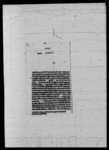A letter from Aravindanātha Gajuryāla to General Bhīmasena Thāpā requesting a study allowance (VS 1878)
ID: DNA_0001_0001
Edited and
translated by Rajan Khatiwoda
in collaboration with
Axel Michaels
Created: 2015-01-16;
Last modified: 2018-11-23
For the metadata of the document, click here
The accompanying edition, translation/synopsis and/or commentary are available under the terms of the Creative Commons Attribution-ShareAlike 4.0 International License
Abstract
In this letter to General Bhīmasena Thāpā, Aravindanātha Gajuryāla requests an allowance to allow him to continue his study at Varanasi.Diplomatic edition
[1r]
1श्रीः\⟪1नं2१⟫1श्रीसंकटा३1श्रीसर्कार१1श्री५महाराजा२1स्वस्तिश्रीमन्मेधावद्गुरूपशिक्षितनिर्मलसुमंत्रणकर्मचातुरीप्रवर्द्धितनिजक्षोणीनायकक्षो
2णीमण्डलसमृद्धिसंभावितराजात्मानुकूलप्रजानुरंजनादिसत्कर्मकुसुमावलीसुरभिसुवा
3सितसत्कीर्त्तिवनितेषुश्रीश्रीश्रीजनरलसाहेवभीमसेनथापाकैषुज्योतिर्विद्अरविन्दना
4थगजुर्यालकोशुभाशीर्वचनपूर्वकम्पत्रमिदम्ञाहाकुशलतपाञिकाचरणकोक्षेमकौश
5ल्यप्रतिदिनस्मरणगर्छौंउप्रान्त¯१¯ ¯कानिमित्त¯३¯ ¯कोजपपूजागर्नुअध्ययनपनी
6गर्नुभनि¯१¯ ¯वाटकामवक्सनुभयामाफिक्ञाहाआईनिरंतरअनुष्ठानपनीअध्ययन
7पनिगर्दैथिञाअनुष्ठान¯१¯ ¯वाटअन्यत्रवक्सनुभयेछतपनिआफ्नुकृत्यछोड्न्याहोइ
8नजयमनाउनुहाम्रोकामैहोभनिछोड्याकोछैनअध्ययनकाअर्थकनसिद्धान्तकौमुदी
9सूर्यसिद्धान्तलीलावतीवीजगणितमुहूर्त्तचिन्तामणि•कर्णकुतूहल•मकरंद•ग्रहलाघ
10वरत्नमालावृहज्जातककेशवीपद्धतिश्रीपतिपद्धतिविट्ठलपद्धतिताँहिभयाकाथिया
11ञाहाआयापछिसिद्धान्ततत्वविवेकशव्देन्दुशेषरमनोरमा•सम्राट्सिद्धान्तवशिष्ठसि
12द्धान्तव्रह्मसिद्धान्त•सोमसिद्धान्त•मुक्तावलीभैसकियावाकि¯१¯ ¯वाटजोवर्षाशन
13वक्सनुभयाकोथियो•सोवीचमायद्यपिविछिन्नभयोतपनि¯१¯ ¯देखीअन्यत्रहामि
14लेयाचन्गर्न्याहोइनभनिऋणगरीपनिआजसम्मयथाकथंचित्वर्त्तमानगर्दाऋ
15णपनिभैरहेछ¯२¯ ¯अर्द्धांगहुनुहुंछतपाञिकाचरणकोकीर्त्तिजस्तैदिगंतमा
16फैल्याकोछतस्तैहाम्रोपनिमनोरथतपाञिकाचरणवाटहुन्यैछहामिजस्ताअनन्यग
17तिकाशरण्यहुनुहुंछआजतक्तपाञिकाचरणवाटपालनाभैआयाकोछ•ज्यादा२।४अ
18पूर्वग्रंथकोसंग्रहगर्नुछद्रव्यविनासंग्रहभैसकिदैन•जोआज्ञालेखनाकोन्यूनाधिक्यक्ष
19माभयाजालाकिंवहुइतिसंवत्१८७८आश्विनवदि६रोज२मोकामवाराणसीपुरीशुभम्
20भवतामहमिववहवोममतुभवानिवभवानेकः॥कुमुदिन्यःकतिनविधोर्वि
21धुरिवविधुरेकःकुमुदिनीनाम्॥
Translation
[1r]
No. 11
Glorious Saṃkaṭā – 3
Venerable Sarkāra – 1
The fivefold venerable great king – 2
Hail! This letter of Aravindanātha Gajuryāla together with words of auspicious blessing to thrice venerable General Bhīmasena Thāpā, who has been taught by brilliant teachers, who is esteemed for the riches of his own and his leader’s earthly territory, who has been promoted because of the astuteness of his pure counsel and deeds, and who is honoured by reason of his sweet, aromatic enduring fame, [which is like] a garland of blossoms consisting of such virtues as loyalty to the King and making subjects joyful.
Here [everything] is fine. We daily carry the welfare of your feet in our thoughts.
Uprānta: Since coming here (to Vārāṇasī) we have been continuously studying and carrying out the anuṣṭhāna2 as instructed by -1-3 (i.e. Queen Grandmother Lalitatripurasundarī),4 who said that [we] should study so as to [be able] to mutter the names and perform the worship of -3- (i.e. Venerable Saṅkaṭā) for -1-. The anuṣṭhāna has (now) been given to another party by -1-. Nevertheless, one should not give up one's tasks; [therefore we] have not given up [ours], thinking that it is our work to celebrate [her] victories. Regarding [our] studies, [the texts we studied] there (i.e. in Kathmandu) are: the Siddhāntakaumudī, Sūryasiddhānta, Līlāvatī, Bījagaṇita, Muhūrttacintāmaṇi, Karṇakutūhala, Makaranda, Grahalāghava, Ratnamālā, Bṛhajjātaka, Keśavīpaddhati, Śrīpatipaddhati [and] Viṭṭhalapaddhati. [We] have been studying [the following texts] since coming here: the Siddhāntatattvaviveka, Śabdenduśekhara, Manoramā, Samrāṭsiddhānta, Vaśiṣṭhasiddhānta, Brahmasiddhānta, Somasiddhānta and Muktāvalī. [Regarding] the rest, the annual sum granted by-1-, has meanwhile ended. Nevertheless, thinking that we should not ask [for support] from anybody else than -1-, and having taken a loan to sustain [ourselves] somehow until today, [we] find [ourselves] in debt. -2-5 (i.e. The fivefold venerable great king)6 is the other half of [our] body. As the glory of your feet has spread out endlessly, in the same way our heart's wish will be fulfilled by your feet. You are the salvation for those like us who have no other refuge. Until today your feet have provided protection. Moreover, [we] need to acquire 2-4 recent books. Without the means [we] cannot do so. [We shall do] as you order. Forgiveness will doubtlessly be granted for any excesses and omissions in what we have written. What more [to say to the knowledgeable]?
Monday, the 6th of the dark fortnight of Āśvina, in the [Vikrama] era year 1878 (1821 CE). Residence: Vārāṇasī city. Auspiciousness.
For you there are many like me; [but] for me there is only one like you, [namely] you [yourself]. Are there not numerous water-lilies for the moon? But for water-lilies there is only one like the moon, [namely] the moon [itself].
Commentary
This document is part of an extant set of three letters sent by Aravindanātha Gajuryāla from Varanasi (see DNA_0002_0069, also addressed to Bhīmasena Thāpā; DNA_0004_0038, scribed on the same day as the present letter but addressed to the queen grandmother Lalitatripurasundarī). The names of the texts mentioned indicate that Aravindanātha was sent to India’s reknowned seat of learning by Lalitatripurasundarī to study Sanskrit grammar and astrology. These fields were highly prestigious ones at royal courts of the time. The Śāha court seems to have had an especially keen interest in astrology, and indeed astrologists were important court counsellors. The two astrologists of Pṛthvīnārāyaṇa Śāha, Kulānanda and Bhānu Jaisī predicted, for example, that he would conquer the Kathmandu Valley (see D.R. Panta VS 2073: 11-12).
DNA_0004_0038 was written in almost the same wording to the queen grandmother Lalitatripurasundarī, one of the wives of King Raṇa Bahādura and regent of his son Gīrvāṇayuddha, and grandson Rājendra (see, Regmi et al 1981: 145-146). One question, then, is whether Aravindanātha Gajuryāla’s studies were being sponsored by different persons simultaneously. In his letter to the queen grandmother, he writes of being told by Pandit Raghunātha that he was to discontinue his studies. One can for the time being only speculate whether this was the unnamed paṇḍita alluded to in the present document as having stepped into Aravindanātha’s shoes.

